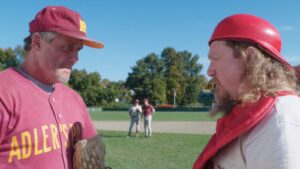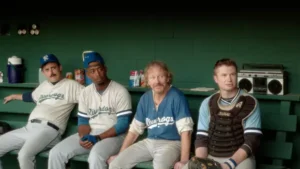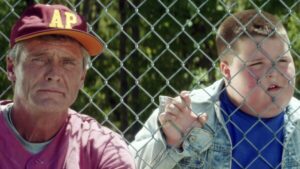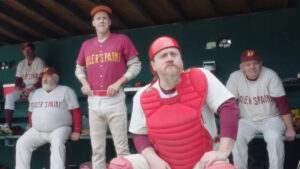Publication Date: 05-30-2025
Eephus (2025) review
Dir. Carson Lund
By: Steve Pulaski
Rating: ★★★½
“It’s kind of like baseball. I’m looking around for something to happen, and then, poof, game’s over.”
“Is there anything more beautiful than the sun setting on a fat man stealing second base?”
“My knees are on fire. I could cook a rack of ribs on these fuckers. But it’s worth it, though. Every pin and needle.”
These are the kind of pithy observations, musings, and ramblings that permeate the air on an otherwise lazy Sunday in late October in New England, where a gaggle of middle-aged men gather to play recreational baseball one last time. For decades, Soldier’s Field has been a reliable place for employees at Adler’s Paint to gather to face their opponents who work at the nearby Riverdogs. The land will soon be excavated and construction on a new school will soon begin, but not before these old-timers can hear the crack of the bat and run the bases during one final scrimmage.
Carson Lund’s Eephus — named after the rare, high-arching, low velocity pitch geared to throw off a batter’s sense of timing and rhythm — is an auspicious directorial debut, and one of the year’s most affecting movies thus far. The above quotes are said by characters whose names I don’t recall. Quite often, the dialog is off-screen. Lund’s focus, combined with Michael Basta and Nate Fisher’s script, favors the collective. Eephus feels very natural insofar that it’s basically presented as a long baseball game, with Lund’s camera drifting and rifting to every point of the diamond, the dugout, the bleachers, a food truck operator, and the occasional passerby.
The result is an easygoing, languid dramedy with laughs big and small coupled with poignant emotional moments about male camaraderie and a shared sense of loss.

“I shouldn’t be here. No one should. It’s dark and it’s late.”
“We have a serious problem. No one can see.”
“I just realized that guy’s wife’s name is Linda Belinda.”
Set in the 90s, the players roll up in pickup trucks and station wagons that look beat to hell. One is responsible for a bucket of balls. Another brings a push-button radio that plays parodic local advertising straight out of Grand Theft Auto: San Andreas. One of the voices on the radio is Frederick Wiseman, one of the greatest documentarians in cinema history. He’s one of the few notable names in the film alongside Bill “Spaceman” Lee, the beloved lefty pitcher from the Boston Red Sox.
The game the two businesses play is not meant for an audience. We can assume most of their scrimmages over the years have been sparsely attended. There’s stray family members, a dedicated scorekeeper (Cliff Blake), a gotta-be 90-year-old fan who reminisces about how many hot dogs he’s consumed in his life, and the occasional youngster who watches these men out of fascination and pity. Like the titular pitch, the film is unhurried in its pacing and the dialog at times laconic. Mostly, it’s a smattering of small talk in the dugout and outfield. Some moments, such as when the starting pitcher is nailed in the chest by an errant ball, command more dialog than others, but those are mostly just players chiming in with wisecracks, jokes, or half-hearted statements of concern.
As the game drones on, and the grass becomes increasingly littered with beer cans, the bright blue sky slowly transitions to darkness. An east coast chill begins permeating the air, and this dilapidated ballfield doesn’t have the luxury of large, overhead lighting. Some players bring their cars onto the diamond and shine their brights onto the field for some illumination, all while Greg Tango’s camera affords us a wide variety of long-shots that capture the action from a distance.

“Field’s talking. It doesn’t want to leave.”
“Field’s staying. They’re just gonna put a bunch of bricks on it.”
“It’s kinda cold out here, guys. It’s warmer in the dugout.”
One of several hilarious moments comes when Adler’s captain is chided by his brother, who pulls up and tells him a christening is taking place today and his family is wondering where the hell he’s at. When he bolts, Ed (Keith Williams Richards of Uncut Gems fame) takes over pitching duties, and is often the one balking at Graham (Stephen Radochia), the Riverdogs coach, for deliberately prolonging the game. The finality of the situation reminded me a lot of Stewart O’Nan’s phenomenal novella, Last Night at the Lobster, which chronicles a staff at Red Lobster during the final day of the restaurant’s operation. There’s an underlying sadness to everything, including common annoyances, when you realize they’ll be the last.
In moments of both humor and humility, Eephus examines how these men have spent decades regularly coming to the ballfield not truly to play the game but for the companionship their private lives desperately lack. Nothing is stopping these dudes from getting together at the bar, or going to each other’s homes once the diamond no longer exists. However, the unwritten code of boomer masculinity prohibits them from doing so. As the game winds down in the early hours of the evening, one man suggests that they get together as a big group sometime soon since “you have everybody’s contact.” The other man just nods and says he’ll think about it. That’s as much thought as he’ll give it.
As much as I love sports, baseball is difficult for me to embrace. Ironically, I’ve attended more minor league baseball games than any other sporting event. Even as a kid, with no interest in the game, I loved going with my father and his friends. It was a good excuse to enjoy the nice weather, eat Dippin’ Dots, mingle with the beer vendors and personnel we all got to know over multiple summers, and see how many beers my old man could down before he started slurring. The sport is called a “passtime” for a reason; that’s exactly what it does.

“Look at yourself, you’re a grown man playing a fucking kid’s game!”
Eephus does more than pass time, however. It’s a quiet, understated little movie that examines male friendships and their practically built-in fragility. Although it’s set in decades past, it carries a timeless quality, especially in one key nuance: the necessity of the “third place” in American society. Most people have two immediate places they find themselves: at home or at their workplace. A “third place” is a location that fosters human connection, such as churches, libraries, parks, bars, cafes, and gyms. The older you get, the more you begin to realize how alcohol is practically a built-in function at most third places. They are necessary in a functioning society, and among many things, Lund’s film shows the dangers brought on by their sudden disappearance.
Starring: Keith William Richards, Bill Lee, Cliff Blake, Stephen Radochia, Ray Hryb, Wayne Diamond, David Pridemore, Keith Poulson, John R. Smith Jr, Pete Minkarah, and Frederick Wiseman. Directed by: Carson Lund.
About Steve Pulaski
Steve Pulaski has been reviewing movies since 2009 for a barrage of different outlets. He graduated North Central College in 2018 and currently works as an on-air radio personality. He also hosts a weekly movie podcast called "Sleepless with Steve," dedicated to film and the film industry, on his YouTube channel. In addition to writing, he's a die-hard Chicago Bears fan and has two cats, appropriately named Siskel and Ebert!


